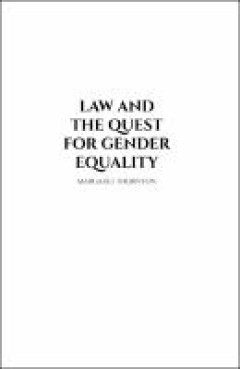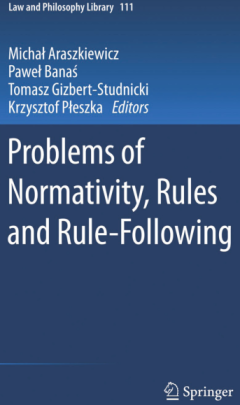Filter by

Islam, women's sexuality and patriarchy in Indonesia ; silent desire
Buku ini mengeksplorasi hubungan intim perkawinan perempuan Muslim Indonesia yang telah menikah. Selain menggambarkan dan menganalisis hubungan seksual mereka, buku ini juga menyelidiki bagaimana Islam memengaruhi wacana seksualitas di Indonesia, dan khususnya bagaimana ajaran Islam memengaruhi persepsi dan perilaku perempuan Muslim yang telah menikah dalam hubungan seksual mereka dengan suami …
- Edition
- -
- ISBN/ISSN
- 9781003042723
- Collation
- 1 online resource (252 pages)
- Series Title
- -
- Call Number
- 297.4 RIY i

Judicial law-making in European constitutional courts
Buku ini menganalisis kekhususan aktivitas pembuatan undang-undang oleh pengadilan konstitusi Eropa. Hipotesis utamanya adalah bahwa saat ini pengadilan konstitusi merupakan legislator positif yang posisinya dalam sistem organ negara perlu didefinisikan ulang. Buku ini membahas analisis aktivitas pembuatan undang-undang oleh empat pengadilan konstitusi di negara-negara Barat: Jerman, Italia, Sp…
- Edition
- -
- ISBN/ISSN
- 9781003022442
- Collation
- 1 online resource.(Pages 278)
- Series Title
- -
- Call Number
- 342.05 WAT j

Private law, nudging and behavioural economic analysis : the mandated-choice …
Menawarkan perspektif baru tentang "dorongan", buku ini menggunakan paternalisme hukum untuk mengeksplorasi bagaimana sistem hukum dapat mempromosikan kebijakan yang baik tanpa mengabaikan otonomi pribadi. Buku ini menunjukkan bahwa dilema antara aturan opt-in yang tidak efisien dan skema opt-out yang membatasi otonomi gagal untuk secara realistis menangkap rentang opsi yang tersedia bagi pembu…
- Edition
- -
- ISBN/ISSN
- 9781003014652
- Collation
- 1 online resource.(Pages 188)
- Series Title
- -
- Call Number
- 346 KAR p

Actualizing human rights : global inequality, future people, and motivation
Buku ini berpendapat bahwa hak asasi manusia pada akhirnya dapat diaktualisasikan, dalam dua pengertian. Dengan menjawab tantangan-tantangan penting terhadap hak asasi manusia, relevansi hak asasi manusia di dunia nyata dapat dimunculkan; dan orang-orang di seluruh dunia dapat termotivasi sesuai kebutuhan untuk mewujudkan hak asasi manusia. Mengambil perspektif dari filsafat moral dan politik, …
- Edition
- -
- ISBN/ISSN
- 9781003011569
- Collation
- 1 online resource. (Pages 142)
- Series Title
- -
- Call Number
- 341.48 PHI a

Indigenous-industry agreements, natural resources and the law
Kumpulan yang disunting ini adalah buku kolaboratif interdisipliner dan internasional yang menyelidiki secara kritis fenomena yang berkembang dari perjanjian industri-Pribumi – perjanjian yang dibentuk antara masyarakat Pribumi dan perusahaan yang terlibat dalam industri sumber daya alam ekstraktif. Perjanjian-perjanjian ini semakin banyak jumlahnya dan relevan, tetapi belum ada studi sistema…
- Edition
- -
- ISBN/ISSN
- 9780429505638
- Collation
- 1 online resource (Pages 302)
- Series Title
- -
- Call Number
- 346.0432 AYA i

Internet of things and the law : legal strategies for consumer-centric smart …
Internet of things dan hukum: strategi hukum untuk teknologi pintar yang berpusat pada konsumen merupakan analisis paling komprehensif dan terkini tentang isu hukum di Internet of Things (IoT). Selama beberapa dekade, semakin berkurangnya kepentingan kekayaan dan kekuasaan yang nyata – dan semakin pentingnya kekayaan dan kekuasaan yang tidak berwujud – telah menjadi subjek banyak penelitian…
- Edition
- -
- ISBN/ISSN
- 9780429468377
- Collation
- 1 online resource (xi, Pages 390)
- Series Title
- -
- Call Number
- 343.09944 DIE i

Recent developments in antitrust; Theory and Evidence
Para spesialis membahas isu-isu konseptual dan empiris terkini yang terlibat dalam perumusan dan penegakan kebijakan antimonopoli. Kebijakan antimonopoli di Amerika Serikat dan Eropa semakin bergantung pada analisis ekonomi. Teori ekonomi dan analisis empiris memainkan peran utama dalam keputusan antimonopoli di pengadilan dan dalam perumusan dan penegakan kebijakan. Kasus-kasus antimonopoli di…
- Edition
- -
- ISBN/ISSN
- 9780262270229
- Collation
- 1 online resource (xviii, 333 pages) :
- Series Title
- CESifo Seminar Series
- Call Number
- 343.0721 CHO r

State making and environmental cooperation; Linking Domestic and Internationa…
Sungai Amu Darya dan Syr Darya di Asia Tengah mengalir melintasi gurun dan bermuara di Laut Aral. Di bawah kekuasaan Soviet, begitu banyak air dialihkan dari sungai untuk keperluan pertanian sehingga kadar salinitas meningkat dengan cepat dan laut menyusut. Terjadi peningkatan badai debu yang mengandung residu garam beracun, dan gurun baru mulai menggantikan laut. Pada saat yang sama, limpasan …
- Edition
- -
- ISBN/ISSN
- 9780262285919
- Collation
- 1 online resource (ix, 274 pages)
- Series Title
- Environmental Protection & Policy
- Call Number
- 344.046 WEI s

Law and the Quest for Gender Equality
For centuries, law was used to subordinate women and exclude them from the public sphere, so it cannot be expected to become a source of equality instantaneously or without resistance from benchmark men—that is, those who are white, heterosexual, able-bodied and middle class. Equality, furthermore, was attainable only in the public sphere, whereas the private sphere was marked as a site of in…
- Edition
- -
- ISBN/ISSN
- 9781760465506
- Collation
- -
- Series Title
- -
- Call Number
- 340

Problems of Normativity, Rules and Rule-Following
* Menyajikan wawasan interdisipliner tentang masalah normativitas, aturan, dan aturan berikut. * Memungkinkan konfrontasi dari berbagai pendekatan. * Ditulis oleh para ahli terkemuka dari tradisi filosofis dan hukum yang berbeda. * Mempromosikan dialog di antara para filsuf, ahli logika, dan ahli teori hukum. ;;; Masalah normativitas, aturan, dan mengikuti aturan sering kali muncul dalam berbag…
- Edition
- 111
- ISBN/ISSN
- 978-3-319-09375-8
- Collation
- -
- Series Title
- Hukum dan Filsafat
- Call Number
- 340 ARA p
 Computer Science, Information & General Works
Computer Science, Information & General Works  Philosophy & Psychology
Philosophy & Psychology  Religion
Religion  Social Sciences
Social Sciences  Language
Language  Pure Science
Pure Science  Applied Sciences
Applied Sciences  Art & Recreation
Art & Recreation  Literature
Literature  History & Geography
History & Geography